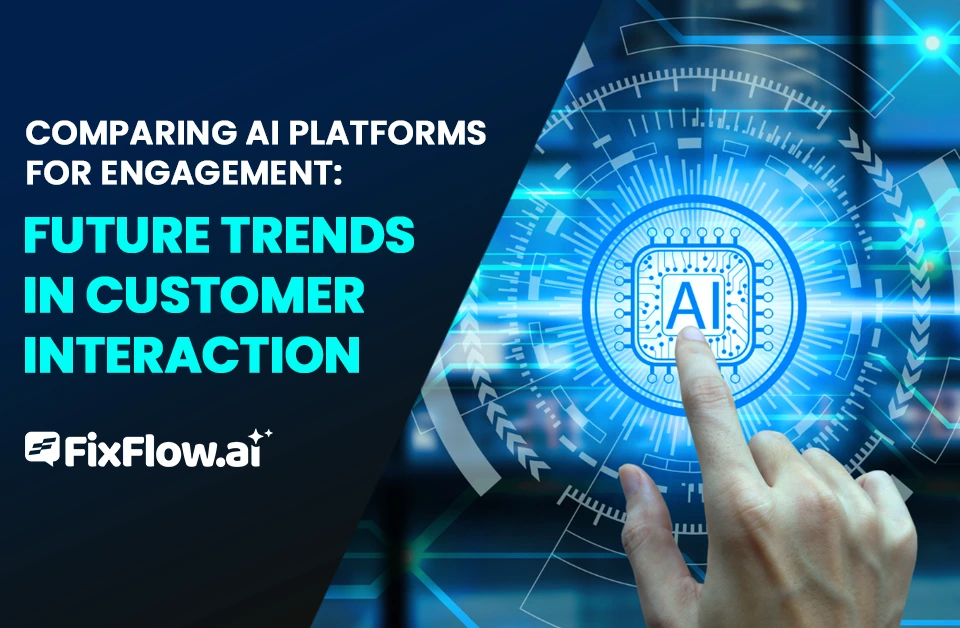Comparing AI Platforms for Engagement: Future Trends in Customer Interaction
When comparing AI platforms for engagement, it’s essential to evaluate how they align with your business goals and the level of interaction you want. Look for key features like natural language processing, real-time chat, and predictive analytics to optimize customer interactions. AI can transform your customer service by automating routine queries and providing hyper-personalized experiences tailored to individual needs. Future trends suggest AI will anticipate customer needs with voice-activated engagement and emotional intelligence. With the right tools, you can elevate your customer experience to intuitive and dynamic levels. Curious to discover more about making AI work for you?
Evaluating Leading AI Platforms
When evaluating leading AI platforms, it’s essential to consider how well each one aligns with your business needs and goals. AI engagement platforms offer a variety of features tailored to different industries and objectives, so you’ll want to focus on what matters most to your operations. Consider whether a platform excels in areas like natural language processing (NLP), real-time chat capabilities, or predictive analytics, as these can significantly enhance your engagement strategies.
Distinguishing between chatbots and virtual assistants also plays an essential role. While chatbots are often designed for specific, rule-based interactions, virtual assistants can provide more dynamic and personalized experiences due to their advanced AI capabilities. Your choice between the two should reflect the level of interaction you aim to achieve with your customers.
Future trends in AI communication are also worth noting. For instance, advancements like emotion-aware AI and cross-channel conversation history are set to redefine how businesses interact with clients. By keeping an eye on these trends, you can better prepare your business to adapt and thrive in an evolving digital landscape, ensuring that your AI platform remains a valuable asset for customer engagement.
Enhancing Customer Service With AI
As you explore how AI platforms can elevate customer service, consider how these tools not only streamline interactions but also enhance personalization and efficiency. Conversational AI tools, for instance, empower you to automate routine queries, freeing up your team to handle more complex issues. By integrating AI personalization into your customer service strategy, you can tailor responses based on individual preferences and past interactions. This means every communication feels relevant and timely, building stronger customer relationships.
Predictive customer behavior analysis is another powerful feature of AI platforms. It allows you to anticipate needs before they arise, offering proactive solutions that can prevent potential issues. Imagine knowing which products a customer is likely to be interested in based on their browsing or purchase history. AI-driven insights enable you to make data-backed decisions that align with your customers’ evolving needs.
Implementing these AI enhancements in your customer service can lead to quicker resolutions, higher satisfaction rates, and ultimately, increased loyalty. By leveraging the capabilities of conversational AI tools and predictive analytics, you’re not just responding to customer queries—you’re transforming the entire service experience into something more dynamic and anticipatory.
Personalization Through AI Technology
Leveraging AI technology enables you to deliver highly personalized experiences by analyzing customer data and tailoring interactions to individual preferences and behaviors. AI-driven personalization allows you to create a seamless and engaging customer journey that feels unique to each individual. By understanding patterns in customer behavior, you can craft hyper-personalized messaging that resonates with their specific needs and desires. This not only enhances the customer experience but also boosts engagement and loyalty.
Predictive routing is another powerful tool in your AI arsenal. It guarantees that customer inquiries are directed to the most suitable agent or resource, based on real-time data and past interactions. This minimizes wait times and improves resolution rates, making your service more efficient and satisfactory for the customer. Imagine a system where each interaction is precisely tailored, from the marketing message to the support provided, all thanks to AI’s analytical capabilities.
Future Trends in AI Engagement
Imagine a future where AI not only responds to customer queries but also anticipates needs through voice-activated engagement and emotion-aware technology. You’re exploring a landscape of ai-driven cx platforms that are set to revolutionize how businesses interact with their customers. By 2025, customer engagement platforms will seamlessly integrate voice recognition and emotional intelligence, allowing for more nuanced and human-like interactions. These next-gen customer interaction systems will not only understand what your customers are saying but also how they’re feeling, offering personalized solutions before they’ve even asked for them.
As we approach this future, ai-driven cx platforms will transform customer experiences into dynamic and predictive interactions. Picture a platform that not only acknowledges a customer’s request but also offers suggestions based on past interactions and current emotional cues. These advancements will make customer interactions more efficient and satisfying, as AI continuously learns and adapts to individual preferences and sentiments.
In the near future, AI will enhance your ability to offer real-time, emotionally intelligent support, setting a new standard for customer engagement. The shift to these advanced platforms will be essential for businesses aiming to stay competitive and meet the evolving expectations of their customers.
Leveraging AI for Competitive Advantage
With AI rapidly transforming customer engagement, adopting these technologies now puts your business ahead of the competition. By utilizing AI in customer engagement, you can create more personalized interactions, streamline processes, and meet customer expectations with a notable impact. When comparing AI engagement tools, it’s evident that the right platform can significantly elevate your customer service. Whether it’s through smart chatbots, predictive analytics, or hyper-personalized messaging, AI tools offer features that traditional systems can’t match.
In the future of customer interaction, the ability to proactively engage with customers and predict their needs will become a defining competitive edge. AI’s capability to analyze vast amounts of data in real time means you can make informed decisions faster than ever. By choosing the right AI tools, you not only enhance customer satisfaction but also drive loyalty and retention. When comparing AI engagement tools, consider factors such as real-time chat, sentiment analysis, and integration capabilities to find the best fit for your business. Embracing these advancements now will position your company as a leader in innovative customer experience, giving you an undeniable advantage in your industry.
Frequently Asked Questions
How Does AI Maintain Data Privacy in Customer Interactions?
You may be wondering how AI maintains data privacy during customer interactions. Well, AI systems often use encryption to secure data in transit and at rest, ensuring your customers’ information stays protected. They also implement access controls, meaning only authorized personnel can view sensitive data. Plus, anonymization techniques strip identifiable details from data sets, reducing privacy risks. So, when using AI, you’re safeguarding customer interactions and building trust.
What Are the Ethical Considerations in Using AI for Customer Engagement?
When using AI for customer engagement, it’s essential to consider privacy, consent, and transparency. Customers must know how their data is being used and have control over it. Ensure your AI systems don’t discriminate or perpetuate bias. Always keep a human in the loop for sensitive interactions. Balancing automation with empathy is key to maintaining trust and delivering a positive customer experience. Don’t overlook these ethical aspects.
How Can Small Businesses Afford AI-Powered Engagement Platforms?
You may be wondering how small businesses can afford AI-powered engagement platforms. Start by exploring budget-friendly options, such as HubSpot AI, which offers scalable solutions suitable for mid-market needs. Look for platforms with flexible pricing models or those that provide a pay-as-you-go structure. Take advantage of free trials and demo versions to see if it’s a good fit. Additionally, consider grants or financing options specifically designed for tech adoption to ease initial costs.
What Training Is Required for Staff to Use AI Platforms Effectively?
To effectively use AI platforms, you’ll need to train your staff in several key areas. Start with basic AI concepts and how your specific platform works. Focus on data input and management, since clean data is essential. Make sure your team understands how to interpret analytics and reports. Don’t forget customer interaction skills—they’re important when AI hands over to a human. Regular workshops and updates will keep everyone sharp and up to date.
How Do AI Platforms Impact Customer Trust and Brand Loyalty?
You may wonder how AI platforms affect customer trust and brand loyalty. Well, they play a significant role by providing consistent, reliable, and personalized interactions. When customers receive quick and accurate responses, their trust in your brand grows. AI can also anticipate needs, making customers feel valued and understood, which fosters loyalty. However, transparency about AI use and data handling is essential to maintaining that trust and ensuring customers feel secure.





